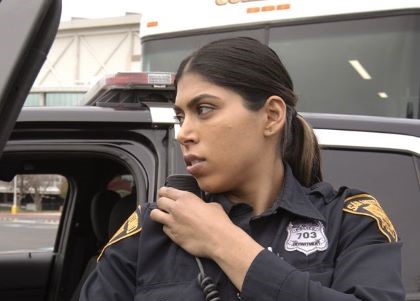
Police and sheriff’s patrol officers are the most common type of police and detectives, and they have general law enforcement duties. They wear uniforms that allow the public to easily recognize them as police officers. They have regular patrols and also respond to emergency and nonemergency calls. During patrols, officers observe people and activities to ensure order and safety. Some police officers work only on a specific type of crime, such as narcotics. Police duties include the following:
Other officers, especially those working in large departments, may work in special units, such as horseback, motorcycle, or special weapons and tactics (SWAT). Typically, officers must work as patrol officers for a certain number of years before they are appointed to a special unit. Transit and railroad police patrol train yards and transportation hubs, such as subway stations. They protect property, employees, and passengers from crimes such as thefts and robberies. They remove trespassers from railroad and transit properties and check IDs of people who try to enter secure areas.
Police and detective applicants must have at least a high school diploma or equivalent, although some federal agencies and police departments may require that applicants have completed college coursework or a college degree. Many community colleges and 4-year colleges and universities offer programs in law enforcement and criminal justice. Further, knowledge of a foreign language such as Spanish is an asset. Many applicants for entry-level police jobs have completed some college coursework, and a significant number are college graduates. Common fields of degree include security and protective service and social science.
Candidates for law enforcement appointment usually attend a training academy before becoming an officer. Training includes classroom instruction in state and local laws and constitutional law, civil rights, and police ethics. Recruits also receive training and supervised experience in subjects such as patrol, traffic control, firearm use, self-defense, first aid, and emergency response.
Some police departments have cadet programs for people interested in a career in law enforcement who do not yet meet age requirements for becoming an officer. These cadets do clerical work and attend classes until they reach the minimum age requirement and can apply for a position with the regular force. Applicants may have to pass physical exams of vision, hearing, strength, and agility, as well as written exams. Candidates typically go through a series of interviews and may be asked to take polygraph (lie detector) and drug tests.
Peace Officer Standards and Training (POST) Certificate: The POST certificate is a fundamental requirement for law enforcement officers in many states, ensuring they meet the minimum training and competency standards necessary to serve in their roles. This comprehensive certification covers a range of topics including legal procedures, use of force, crisis intervention, and ethics.
Police officers who are authorized to carry firearms while on duty may seek a weapons certification. This training ensures officers are proficient in the safe handling, operation, and marksmanship of their issued weapons. It covers firearm safety rules, shooting stances, aiming techniques, and scenario-based training to simulate real-world shooting situations. Officers must regularly undergo requalification tests to maintain their firearms certification.
CPR and First Aid Certification is essential for law enforcement in order to respond effectively to medical emergencies they may encounter while on duty. This training covers techniques for cardiopulmonary resuscitation (CPR), treating wounds, managing fractures, and providing basic life support until professional medical help arrives. Officers must renew this certification periodically to ensure they maintain their proficiency in life-saving techniques.
This excerpt from the documentary 'Shots Fired' offers a rare look inside police training in Utah, and explores several scenarios.
Constables Keith Martin and Derek Thompson put on a "use of force" demonstration at Algonquin College to address some of the concerns over such tactics being used on persons being arrested.
The El Monte Police Department is proud to bring you 'A Day in The Life,' featuring Officer Sergio Machado. This intimate look gives you a perspective preparing for and working a police shift.
An up-close look at police reform efforts in Newark, NJ. With gripping, on-the-ground access, this film examines the difficult relationship between the police and the community of Newark.
Ask yourself if you can see yourself as a law enforcement professional, having daily contact with the public. Some situational awareness is called for, as police encounters are dangerous by nature. While classes and internships will prepare you well, certain innate qualities that you bring to bear will help you succeed.
Attending college offers benefits beyond academic learning. Students are exposed to diverse perspectives that challenge their thinking. This fosters problem-solving and communication. College is also about social skills. Whether through student organizations or sports teams, students develop leadership skills and build lasting friendships.
This website is not affiliated with any educational institution, and all trademarks are the exclusive property of the respective owners. All copyrighted works on this website are offered for educational purposes only, governed by the four-factor rule, section 107 of the Copyright Act. CampusInspector.com is the work of a group of students in Bangkok, using data from the US Department of Education, Postsecondary Education Data System (IPEDS). If any information is incorrect, please contact us with updates.